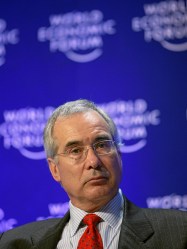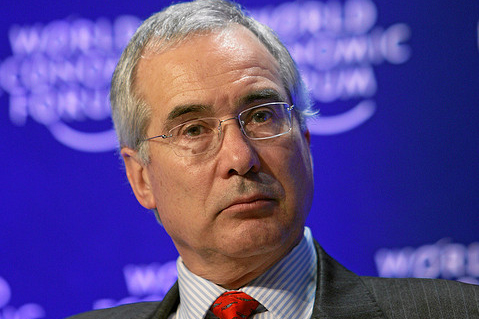You will be forgiven for not knowing who Nicholas Stern is. In short, a former chief economist for the World Bank, he began service in the office of Britain’s Chancellor of the Exchequer. There, in 2005, he was asked to produce what became a definitive assessment of the economic effects of climate change. Published in 2006, the “Stern Review Report on the Economics of Climate Change” suggested that climate change would result in a 5 percent drop in the annual gross domestic product in perpetuity, and that stabilizing the climate would itself cost 2 percent — a massive sum.

World Economic ForumNicholas Stern not being listened to at Davos, 2009.
Last week in Davos, however, Stern suggested that his conclusions were wrong. They were too optimistic. From The Guardian:
In an interview at the World Economic Forum in Davos, Stern, who is now a crossbench peer, said: “Looking back, I underestimated the risks. The planet and the atmosphere seem to be absorbing less carbon than we expected, and emissions are rising pretty strongly. Some of the effects are coming through more quickly than we thought then.”
The Stern review, published in 2006, pointed to a 75% chance that global temperatures would rise by between two and three degrees above the long-term average; he now believes we are “on track for something like four “. Had he known the way the situation would evolve, he says, “I think I would have been a bit more blunt. I would have been much more strong about the risks of a four- or five-degree rise.” …
“This is potentially so dangerous that we have to act strongly. Do we want to play Russian roulette with two bullets or one? These risks for many people are existential.”
The risks for the people to whom Stern was speaking — those attending the exclusive Davos convening — were not existential at all. They largely have the resources to avoid climate disaster’s worst effects; many won’t live to see them.
This has long been the problem Stern faces. In late 2011, Stern suggested a key contradiction in climate policy: markets value fossil fuel companies continuing to extract beyond levels that world governments say are acceptable. Stern, as a representative of the latter group, has tried for years to use the language of the former group — economics — to explain to them why and how climate change must be halted. But the problem isn’t in his translation. It’s in the unwillingness of those with money and power to invest that money and that power in a more stable future. Stern saying he was downplaying the risk of climate change is another sentence in a language they understand, but another statement they aren’t interested in hearing.


